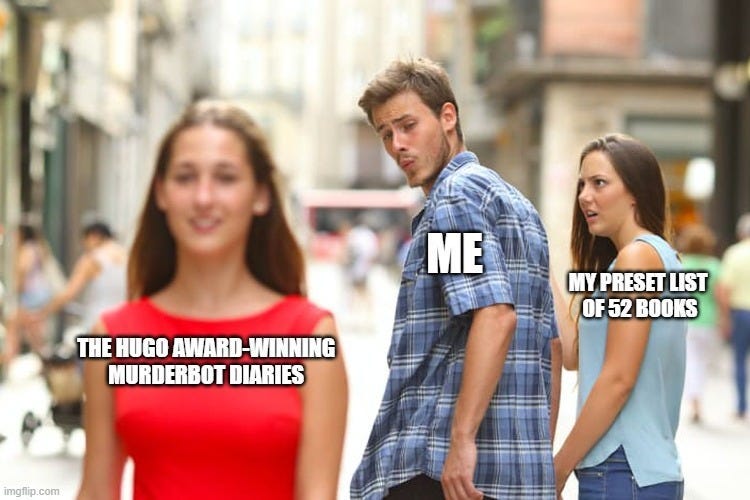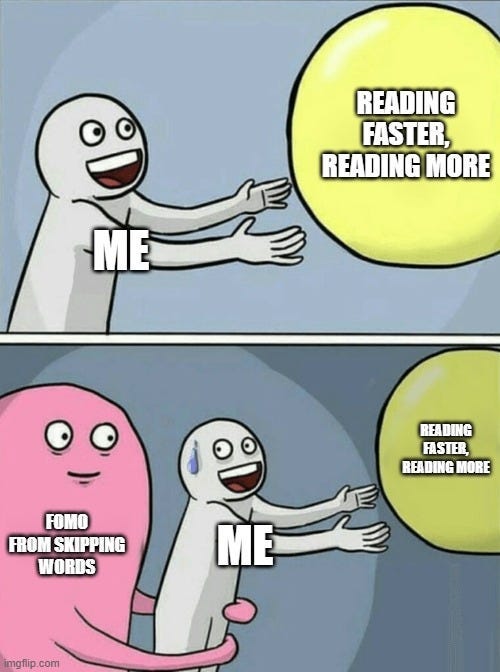I failed to read 52 books in a year. Here’s what I learned…
This was my first year attempting to read 52 books and I failed. There were a lot of factors, but along the way I learned more about…
This was my first year attempting to read 52 books and I failed. There were a lot of factors, but along the way I learned more about myself, my learning style, and the dangers of lists, so it wasn’t a total wash.

Here’s what I learned:
Setting a list doesn’t mean you have to stick to it
Circumstances change what’s important
Learn a little and dive into the interesting bits
Fiction is hard
Bonus: You’re allowed to stop reading boring books
Setting a list doesn’t mean you have to stick to it
Over the last year, I probably read more books off the list than the 52 I put on the list. It was well-intentioned, but after the first eight or so books, I started getting distracted. I’d learn about a new topic, read a different book or two, then grimace at the books left on my list.
At the time, I viewed it as a failure, but for those of you thinking about reading 52 books in a year, go easy on yourself. Instead of creating a list, follow your curiosity and find books that scratch that itch.
You may find yourself becoming passionate about a new subject, or wanting to be a subject matter expert in a new area. Holding to a list you created at the beginning of the year has the potential to hold you back, so give yourself permission to change your list, or don’t keep one at all.
Circumstances change what’s important
In August of this past year, I changed jobs. I moved from a role where I loved my team but felt my career growth stagnating to a role at a Columbus-based startup where the sky was the limit (and still is). Suddenly, half the books I was thinking about reading were no longer as important as flipping through the 1985 classic “Industrial Robots” by Wesley E. Snyder.
Instead of thinking three years out, I was back to thinking three months into the future and was digging through books on robotics, hypergrowth, and operations management. The things I needed to learn changed with my circumstances and I would have stifled my growth had I strictly stuck to my reading list.
Learn a little and dive into the interesting bits
Initially, this was my view of books and the words within them.
“All words in this book are there for a reason, so I will read every single word. After all, several people involved in the book-making process viewed these words as important, so I owe it to them to confirm the importance.”
Facepalm. Not all words are as important as we may think. My concern was that I would miss out on some tiny nugget of knowledge that only reading every word could get me.
With such a big list to get through, I looked into how to read faster and a majority of the recommended techniques boiled down to “stop reading every single word.” Here are the two that stuck out the most.
1. Read the middle 60% of the page. I don’t remember the exact percentage, but by basically reading the center of the page, your brain still comprehends a majority of what is happening. Try it out on any book near you. Reading through a paragraph with only the middle 60% or so of the words, can you still understand what’s happening? Surprising, but generally you can comprehend nearly as well with half the words.
2. Start with the table of contents, read the headings, and only read what you find interesting. Again, another strategy that is likely to trigger FOMO, but makes your reading experience much more focused. What are you trying to get out of this book? Aim for that and skip other chunks that aren’t relevant.
I also found Blinkist to be a bit of a cheat code when it comes to reading faster. The modern-day Cliffnotes, Blinkist gives you a 15-minute summary of the book, calling out important bits, leaving you to dive deeper if you’d like, or abandon the book completely.
Let me know below if you’ve found any methods for increasing your reading speed.

Fiction is hard
From the list of 52, fiction proved to be the hardest. Listening to audiobooks, my mind wandered too much. Setting a scene in my mind while driving on the highway proved to be complicated and too dangerous for me to fully immerse myself in the worlds I was hearing about.
Thinking back to my peak of reading fiction, I was able to turn my brain off and be enthralled by the book for whatever time period I wanted. Now, my mind is clouded, leaving only the time before I fall asleep as the most opportune time to read fiction. The problem is I typically fall asleep a few pages in. Bottom line, I still haven’t figured this one out, but am hopeful I can get back into reading fiction in 2022.
Bonus: You’re allowed to stop reading boring books
This was a rule I had trouble cementing initially. There’s the sunk cost fallacy of books where I feel like I started, so I need to finish. A few chapters into “The Utopia of Rules” by David Graeber, I remembered it’s okay to skim and see if anything else might be interesting, otherwise, put the book down and call it done. Some books are boring, some won’t be right for you, and it’s okay to stop reading those books. It is not a failure on your part.
Final Thoughts
Don’t feel like you have to build out a list of books to push yourself to read more. Some of you may do much better with a list of 52 and if you’re one of those folks I tip my hat to you. If you find yourself struggling, start with one book, build a backlog or wishlist of books you’re interested in, and go from there. Above all, stay curious, and go read something in 2022.




